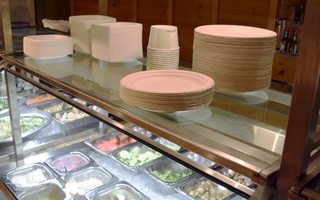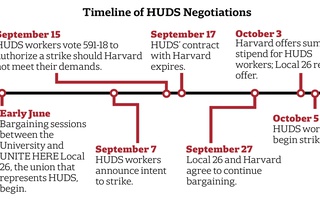With most of its dining services employees chanting criticisms, wielding signs, and forming picket lines around campus, Harvard made do with roughly a fifth of its usual labor supply to feed thousands of students Wednesday.
More than 500 Harvard University Dining Services employees did not show up to work, instead launching a historic strike precipitated by months of contract negotiations with the University. Because a vast majority of its dining services employees are members of the Boston-based union UNITE HERE Local 26, Harvard turned to a motley mix of managers, temporary hires, and available University employees to serve limited menus in the dining halls.
About 70 HUDS managers, 15 temporary hires, and 15 Harvard employees worked in the dining halls to serve meals throughout the day, according to Harvard spokesperson Tania deLuzuriaga. In a statement, deLuzuriaga wrote in an email that the University often hires temporary employees to fill-in for absent HUDS employees and that there are usually more temporary workers on campus than the 15 present on Wednesday.
“On an average day, the University has many more temporary workers on campus, filling shifts that Harvard employees cannot fill,” deLuzuriaga wrote. “Harvard University Dining Services will continue to meet the needs of our students to the best of its ability for the duration of the strike.”
HUDS workers typically staff dining halls and cafes across the University, from Harvard’s Longwood campus to Annenberg Hall by the freshman dorms. But on Wednesday, three dining halls closed because of the strike, funneling students to fewer Houses.
While some outside employees did slip through HUDS’s picket lines and staffed Harvard’s dining halls, Local 26 President Brian Lang said he was not surprised or concerned that Harvard had hired additional labor.
"Look, that’s what we expected them to do. The purpose was not to completely shut down dining hall operations, but to let them know how workers really feel,” Lang said, referring to the strike. “We've been extremely successful in that way."
The strike is the culmination of months of tense negotiations between the union and Harvard. The two parties have clashed over health benefits and wages for HUDS workers, and bargaining will continue throughout the strike.
On their first day of picketing, HUDS workers and students rallied outside of dining halls and in common spaces, such as the Science Center and Harvard Yard. They began their strike at 6 a.m. and continued throughout the better part of the day.
Some students lamented the loss of the familiar faces in the dining halls. Andree M. Franco-Vasquez ’17 said she understands the need for temporary workers but hopes the HUDS employees will return soon.
“I guess it’s necessary—someone has to feed us,” she said. “ It’s also kind of shady, because I feel like it makes HUDS workers feel disposable by the University.”
It is unclear how long the HUDS strike will last, or for how long Harvard plans to staff its dining halls with temporary workers.
Dianne Lee ’20, a contributing news writer to The Crimson, said she did not recognize any of the workers in Annenberg Wednesday and that it was strange to encounter a new worker at the check-in desk.
“Nobody really knew how today was going to go,” she said.
Michael Gao ’20 said some students he knew felt anxious about coming into contact with the picket line outside of Annenberg. However, he said he felt there was no pressure to avoid eating in the dining halls as a form of support for the strike.
For Audrey H. Effenberger ’19, her decision to eat in the dining hall was more complicated. She said that while the Student Labor Action Movement, an undergraduate group supporting HUDS, has, through social media posts and emails, encouraged students not to feel bad about eating in dining halls, she still felt some hesitation about eating in the Houses.
But, Effenberger said, she needed to eat somehow. Franco-Vasquez said she felt similarly, and said local restaurants were too expensive for her.
However, Franco-Vasquez said, her experience of eating in the dining hall on Wednesday lacked community spirit.
“ It kind of feels like an empty kitchen,” she said.
—Starr writer Claire E. Parker contributed to the reporting for this story
—Staff writer Andrew M. Duehren can be reached at andy.duehren@thecrimson.com. Follow him on Twitter @aduehren.
—Staff writer Mia C.Karr can be reached at mia.karr@thecrimson.com. Follow her on Twitter @miackarrRead more in College News
Cornel West Talks ‘Values, Virtue, and Vision’Recommended Articles
-
 HUDS Workers Ask for Student Support With Mealtime Stories
HUDS Workers Ask for Student Support With Mealtime Stories -
 Harvard Stockpiles Frozen Food Ahead of Potential HUDS Strike
Harvard Stockpiles Frozen Food Ahead of Potential HUDS Strike -
 With Strike Looming, Some Students Unconcerned About their Next Meal
With Strike Looming, Some Students Unconcerned About their Next Meal -
 Harvard—and Dining Workers Union—Prepare for Day One of Strike
Harvard—and Dining Workers Union—Prepare for Day One of Strike -
 Dining Workers Receive Warm Welcome After Strike
Dining Workers Receive Warm Welcome After Strike













